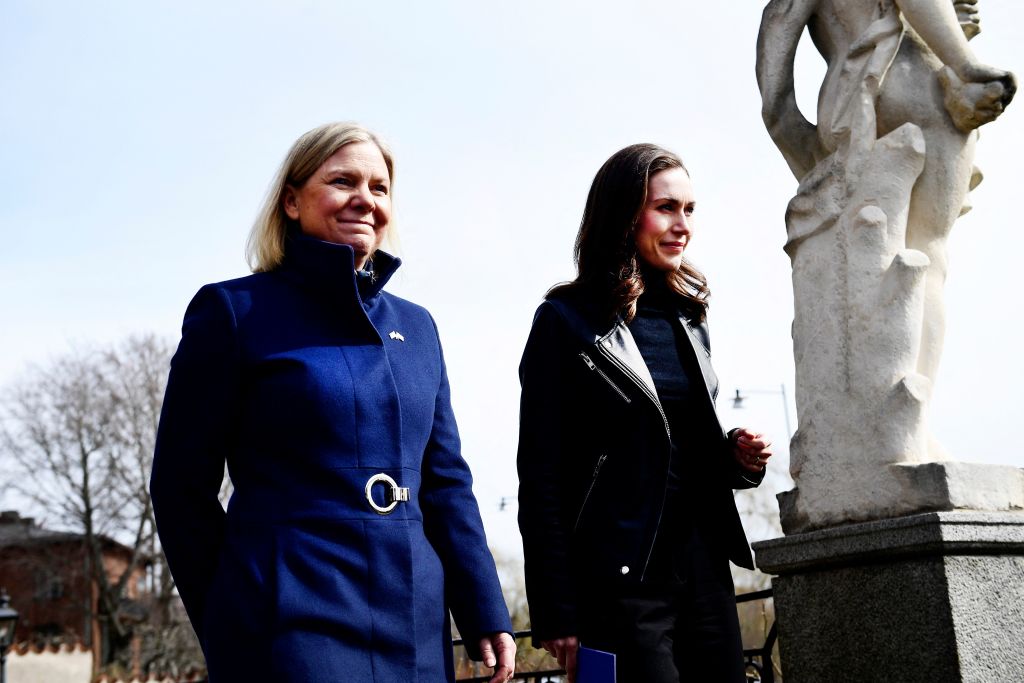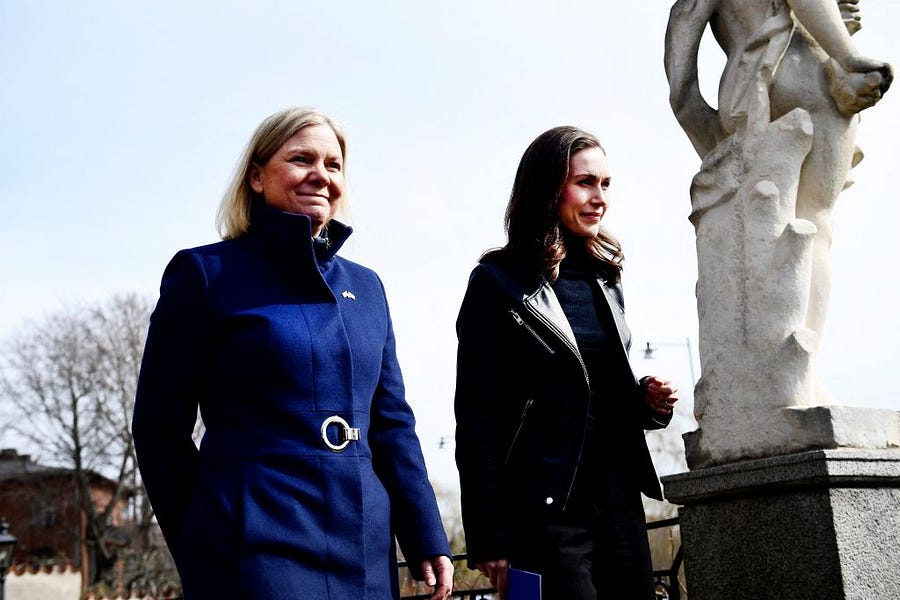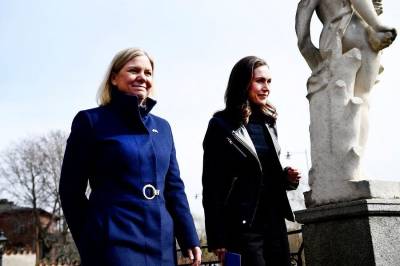Happy Friday! Chag Pesach Sameach to those celebrating the start of Passover tonight, and Happy Easter to our members celebrating on Sunday!
Quick Hits: Today’s Top Stories
Russia’s Ministry of Defense announced Thursday that one of its missile cruisers—The Moskva—sank off the coast of Ukraine this week. Russian officials said a fire detonated ammunition onboard the ship—the flagship of its Black Sea fleet—but the Ukrainian military claimed to have hit the vessel with an anti-ship missile. An anonymous U.S. Defense Department official backed the Ukrainians’ claim, and several other Russian warships have reportedly repositioned further from shore in recent days.
Despite weeks of draconian lockdowns, Chinese health officials reported the country’s highest-ever number of daily COVID-19 cases on Thursday. And it’s not just Shanghai: According to a recent Nomura survey, 45 Chinese cities—home to a combined 373 million people and responsible for about 40 percent of China’s economic output—were either fully or partially locked down as of Monday.
Pfizer and BioNTech announced Thursday that a Phase 2/3 clinical trial featuring 140 children ages 5 through 11 found a 10-microgram COVID-19 vaccine booster dose to be safe and capable of increasing neutralizing antibody titers against the Omicron variant 36-fold compared to two doses alone. The companies plan to apply for emergency use authorization so this age group can receive booster doses. Just 28 percent of U.S. children ages 5 through 11 are currently fully vaccinated.
The average rate for a 30-year fixed-rate mortgage in the United States hit 5 percent this week for the first time since 2011, according to data from Freddie Mac, the government-sponsored mortgage company. Rates have now risen at their fastest three-month rate in 35 years.
The average number of daily confirmed COVID-19 cases in the United States has begun to increase again, up 23 percent over the past two weeks but still lower than it’s been throughout most of the pandemic. Daily COVID-19 deaths, meanwhile, continue to fall, and are down 38 percent over the same time period.
The Labor Department reported Thursday that initial jobless claims increased by 18,000 week-over-week to 185,000 last week, but remained near all-time lows.
Republican National Committee (RNC) Chair Ronna McDaniel announced Thursday the RNC had voted unanimously to withdraw from the Commission on Presidential Debates, the institution responsible for coordinating general election presidential debates since 1988.
Putin’s Scandinavian Screw-Up

Since the Napoleonic Wars concluded more than 200 years ago, Sweden has maintained an almost entirely neutral military status, sitting out both the 20th century’s world wars and remaining officially unaligned throughout the Cold War. Finland’s geopolitical independence doesn’t date back quite that far—never forget absolute legend Aimo Koivunen, the (possibly apocryphal) Finnish soldier who in 1944 accidentally overdosed on army-issued methamphetamines, blacked out, and led invading Soviet forces on a two-week ski chase—but Helsinki managed to survive the Cold War unoccupied thanks to a strict policy of neutrality.
Any change to those long-held stances would set off alarm bells in Moscow; Russian President Vladimir Putin has argued the threat of NATO expansion drove him to invade Ukraine. Flash forward a few weeks, and it’s looking like the invasion will produce the exact expansion he appears to fear. They’re still deliberating, but Sweden and Finland are poised to break their neutrality and ask to join NATO. Former Finnish Prime Minister Alexander Stubb went so far as to call it “a done deal” for Finland.
This is a bit of a self-own for Putin.
Both countries are already economically and politically aligned with the West and have even participated in military exercises with NATO, but they also treasure their neutrality. In December, Finland’s Ministry of Defense reported just 24 percent of Finns supported a NATO bid.
But Russia’s invasion highlighted the value of NATO’s defense pact. As former Swedish Prime Minister Carl Bildt wrote after the war broke out, “There is no way back to a past of illusionary neutrality.” Support for joining the military alliance has hit 68 percent in Finland, and if Finland joins, Sweden will likely follow. A March poll found Swedes’ support for joining NATO jumped from 41 percent alone to 59 percent if Finland also joined. Swedes have realized “they might find themselves in the same position as Ukraine: a lot of sympathy but no military help,” Robert Dalsio, research director at the Swedish Defense Research Agency, told Deutsche Welle.
Finland has led the recent push to consider NATO. Its government this week published a report outlining the pros and cons of membership, including the need to prepare for cyberattacks and border provocations from Russia if it seeks to join. Next, Finland’s parliament will debate the report, and it’s expected to decide quickly. “This will be quite fast, it will happen in weeks,” Prime Minister Sanna Marin said Wednesday. About half of Finland’s parliament publicly approves of a NATO membership bid thus far, with 12 of the 200 firmly opposed and others undecided, according to a poll by Finnish news outlet the Helsingen Sanomat.
Sweden has its own study due out by May 31, and Swedish leader Magdalena Andersson also committed to a swift decision: “I see no point in delaying this analysis or the process.” Swedish media have reported that her government supports a NATO bid, but she is so far avoiding public support or opposition.
Deciding to join in the next few weeks would allow the countries to submit their requests before NATO’s June summit. Both meet NATO’s requirements of being market economy democracies, tolerating diversity, committing to peace, and respecting borders. NATO also requires new members to bring something of value to the “defense” part of the defensive alliance. Sweden’s robust military would fit the bill, and while Finland recently hiked its military spending 70 percent, it also offers more than 800 miles of border with Russia where NATO can station troops.
Unsurprisingly, these deliberations have sent Moscow into something of a frenzy. Putin ally and Russian Security Council member Dmitry Medvedev said Thursday NATO expansion to Finland and Sweden would force Moscow to boost its land, air, and naval forces nearby. “If Sweden and Finland join NATO, the length of the land borders of the alliance with the Russian Federation will more than double. Naturally, these boundaries will have to be strengthened,” he wrote on Telegram, noting Russia would also add nuclear weapons to the area.
So far, the threats haven’t deterred either Scandinavian country. “This kind of nuclear saber-rattling is part of Russia’s playbook,” Sean Monaghan, a visiting fellow at the Center for Strategic and International Studies studying European security told The Dispatch. He argued it could underline for Finland and Sweden the importance of NATO’s defenses: “If anything, that kind of behavior is going to seal the deal.”
If either country asks to join NATO, Russia could theoretically attack while they’re waiting for approval from the 30 current members—before the mutual defense pact kicks in. Monaghan says he assumes Finland and Sweden are likely already asking the U.S. and European countries about temporary security guarantees to cover any gap. But while Putin’s risk appetite shouldn’t be underestimated—particularly after the last few months—Russia may not be up for expanding the war. “I just don’t see Russia wanting to open up a second front right now,” said Paul Poast, an international security researcher and assistant director of the Chicago Project on Security and Threats. “They could reposition some of their [nuclear] weapons closer to the border, but with a nuke does it really matter if it’s closer to the border or if it’s 300 miles away? Probably not. In many ways, then, bringing up these nuclear threats is a low-cost way for them to try to threaten without having to do the more costly action right now of actually mobilizing troops to try to attack.”
Still, Sweden and Finland likely aren’t looking to sit around idly during the interval between requesting NATO membership and actually having the full might of the alliance at their backs. The process of joining can take up to a year, but NATO Secretary General Jens Stoltenberg said the alliance would move to admit them quickly. “If they decide to apply, and that’s a 100 percent Finnish and Swedish decision, then I think it is possible to make a decision quickly and for them to join quickly,” Stoltenberg said in January. “When you see the high level of interoperability between NATO and Finland and Sweden, when you see to what degree all of them meet NATO standards, it should be possible to allow them into our alliance quite quickly.”
In addition to the practical security guarantees, Finland and Sweden’s public consideration of a NATO bid sends a message. “If Putin’s whole thing was ‘NATO’s a threat, and I need to undermine NATO,’ he has accomplished the exact opposite,” Poast said. “Joining NATO is just simply the signal of: ‘We believe in this institution. We want to have a united front against Russia. We always were suspicious of Russia, now we fully know how dangerous Russia is, and this is a way of solidifying our willingness to stand up to Russia.’”
Worth Your Time
Earlier this week, Sen. Steve Daines and Rep. Victoria Spartz—both Republicans—became the first U.S. lawmakers to visit Ukraine since Russia’s invasion began in late February. “Nothing can substitute for actually being here, seeing it first-hand, spending time with the people and leaders here in Ukraine who have been horribly affected by this war,” Daines told Andrew Kramer in an interview outside Kyiv. “Standing in the rubble of the collapsed building, where Ukrainian officials have said that at least 21 people died, Mr. Daines found a child’s toy—a wooden car—and looked into apartments that had been peeled open by the explosion, revealing kitchen cabinets still hanging on a wall,” Kramer writes. “In Bucha, the two watched the Ukrainian authorities remove three bodies from the tan clay soil of a churchyard where a communal grave was being excavated. Mr. Daines described what he had seen as ‘indisputable evidence of war crimes.’ ‘It’s everywhere,’ he said. ‘We’ve been driving for miles and miles and miles, seeing death and destruction caused by Vladimir Putin in this evil invasion.’”
The record high inflation we’re experiencing today has many causes—some of which were completely out of policymakers’ control—but even progressives think it’s pretty clear at this point the American Rescue Plan was too big. “The American Rescue Plan, while well-intentioned, spent too much money too quickly, meaningfully overshooting the output gap and contributing to inflation,” Milan Singh writes for Slow Boring. “According to the Federal Reserve Bank of San Francisco, pandemic fiscal stimulus (CARES and ARP) increased the inflation rate by three percentage points by the end of last year. In hindsight, Democrats should have passed a smaller bill, with less upfront stimulus and more spread-out spending on permanent programs.” For an alternative perspective, Axios’ Neil Irwin on Thursday summarized the White House Council of Economic Advisers’ annual report. “The Biden team isn’t disputing that the president's signature pandemic aid, the $1.9 trillion American Rescue Plan (ARP), contributed to inflation,” Irwin writes. “Rather, they argue that it has created benefits that put the U.S. economy in position to be more resilient to the shocks of 2022—like the Ukraine war and rising interest rates. … The American fiscal response to the pandemic amounted to more than 25% of GDP, well above the 16% in Canada and 11.5% of the Eurozone. The U.S. has also ended up leading those nations in inflation rates, with consumer prices rising 8.5% from December 2019 to December 2021 in the U.S. versus 5.5% in Canada and 4.7% in the Eurozone.”
When the Taliban overran Afghanistan last year, its leaders suggested they would rule more gently than they had before and resist taking revenge on those who opposed them or worked with the United States. An investigation from The New York Times confirms what many predicted: They haven’t kept those promises. “Taliban leaders insisted they would be merciful toward those who had opposed them, declaring a general amnesty for former government workers and members of the nation’s security forces,” a Times team writes in an article that accompanies a 12-minute video detailing the investigation. “The Taliban’s promises were hollow, with grave import. Nearly 500 former government officials and members of the Afghan security forces were killed or forcibly disappeared during the Taliban’s first six months in power. We argue that the United States can still do a lot more to help its former allies—many of whom remain in hiding—find a way to escape the country.”
Presented Without Comment
Also Presented Without Comment
Toeing the Company Line
On the site today, Andrew Fink has a piece on Viktor Medvedchuk, the pro-Russia Ukrainian politician who was recently apprehended trying to escape the country, and Ellen Bork and David Kramer discuss Vladimir Kara-Murza, the Russian pro-democracy leader arrested this week after criticizing Putin’s “regime of murderers” in an interview on CNN. Finally, Andrew Egger ventures down a MAGA media rabbit hole to examine the question of why Rep. Marjorie Taylor Greene has dropped off Steve Bannon’s War Room podcast.
The FBI announced last week it removed Russian malware from networks around the world—including privately owned ones—to prevent a large-scale, Russia-aligned botnet attack. In the latest edition of The Current (🔒), Klon discusses the precarious balance between privacy and national security. Plus: What the first few months of Donald Trump’s Truth Social say about conservatives and Big Tech. “Building a profitable social media platform is hard,” he writes. “But claiming you’re being censored by ‘Big Tech’ is a great way to make money.”
Jonah’s conversation with Matthew Continetti about his new book—The Right: The Hundred-Year War for American Conservatism—was so wonky it needed to be broken up into two Remnant episodes. Part One, published yesterday, covers the 1920s through 1970s. What did conservatism look like before the New Deal? How did William F. Buckley Jr. shape modern politics? Is fusionism still relevant? And how should we remember figures like Richard Nixon, Calvin Coolidge, and George Wallace?
In this week’s Stirewaltisms (🔒), Chris argues that Donald Trump’s endorsements thus far this cycle make one thing abundantly clear: The former president’s interests and the Republican Party’s interests are not in alignment. “Trump, the solipsistic chauvinist, doesn’t care what happens to the Republican Party in Pennsylvania, Georgia, or anywhere else in the next generation, the next decade or even this November,” Chris writes. “What matters to him is how his faction of one is faring right now.”
On today’s jam-packed episode of Advisory Opinions, David and Sarah discuss Elon Musk’s quest to buy Twitter, a 6th Circuit concurrence on nationwide injunctions, library book bans, how to judge what’s best for kids, and more.
Let Us Know
Beyond the schadenfreude of Putin’s violent attempt to keep his neighbors firmly within his own sphere of influence backfiring, what are your thoughts on the prospect of formerly neutral Scandinavian countries joining NATO?







Please note that we at The Dispatch hold ourselves, our work, and our commenters to a higher standard than other places on the internet. We welcome comments that foster genuine debate or discussion—including comments critical of us or our work—but responses that include ad hominem attacks on fellow Dispatch members or are intended to stoke fear and anger may be moderated.
With your membership, you only have the ability to comment on The Morning Dispatch articles. Consider upgrading to join the conversation everywhere.